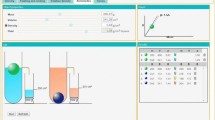Abstract
In this study, we aimed at examining pre-service teachers’ capability to design inquiry learning activity sequences (i.e., inquiry learning spaces or ILSs) after receiving proper training. These ILSs were developed in the context of the Go-Lab ecosystem. The Go-Lab ecosystem includes virtual laboratories (simulations; https://www.golabz.eu/labs) and applications (software scaffolds; see https://www.golabz.eu/apps) that can be embedded in learning activity sequences (inquiry learning spaces), which are developed in a web-based learning environment with the Graasp authoring tool (https://graasp.eu/). Teacher training included presentation of the Go-Lab ecosystem, demonstration of the Graasp authoring tool, and inspection and elaboration on a pilot inquiry learning space. As part of the requirements of two undergraduate university courses, pre-service teachers were asked to develop their own ILS in a context aligned with the national curriculum. As part of the final exam for the courses, they were also asked to transform a lesson plan (an activity sequence in the form of a learning activity sheet) into an ILS. Their ILSs were assessed using a list of criteria developed for the purposes of this study. Our results highlight the strengths and weaknesses of the ILSs developed by pre-service teachers, which in turn have practical implications for training pre-service teachers who will be designing computer-supported inquiry learning activities.
Access this chapter
Tax calculation will be finalised at checkout
Purchases are for personal use only
Similar content being viewed by others
References
De Jong, T., Sotiriou, S., Gillet, D.: Innovations in STEM education: the go-lab federation of online labs. Smart Learn. Environ. 1, 1–16 (2014). https://doi.org/10.1186/s40561-014-0003-6
Efstathiou, C., Hovardas, T., Xenofontos, N., Zacharia, Z., de Jong, T., Anjewierden, A., van Riesen, S.A.N.: Providing guidance in virtual lab experimentation: the case of an experiment design tool. Educ. Tech. Res. Dev. 66, 767–791 (2018). https://doi.org/10.1007/s11423-018-9576-z
Hovardas, T.: A learning progression should address regression: insights from developing non-linear reasoning in ecology. J. Res. Sci. Teach. 53, 1447–1470 (2016). https://doi.org/10.1002/tea.21330
Hovardas, T., Zacharia, Z.: A model-based inquiry approach to explore system dynamics and modeling aspects of the prey-predator system. In: Cai, Y., van Joolingen, W., Walker, Z. (eds.) Virtual Reality, Simulations and Serious Games for Education, pp. 99–109. Springer Nature, Singapore (2019)
Hovardas, T., Xenofontos, N., Zacharia, Z.: Using virtual labs in an inquiry context: the effect of a hypothesis formulation tool and an experiment design tool on students’ learning. In: Levin, I., Tsybulsky, D. (eds.) Optimizing Stem Education with Advanced Icts and Simulations, pp. 58–83. IGI Global, Hershey PA, USA (2017)
Hovardas, T., Pedaste, M., Zacharia, Z., de Jong, T.: Model-based science inquiry in computer-supported learning environments: the case of Go-Lab. In: Azad, A.K.M., Auer, M., Edwards, A., de Jong, T. (eds.) Cyber-Physical Laboratories in Engineering and Science Education, pp. 241–268. Springer, Dordrecht (2018)
Leemkuil, H., Tsourlidaki, E., Kypriotis, E., Koslowsky, J., Xenofontos, N., Papaevripidou, M., Hovardas, T., Irakleous, M., Zacharia, Z., Dziabenko, O., Siiman, L., Rannastu, M., Mäeots, M., Leijen, Ä., Pedaste, M., Almeida, M.L., Doran, R., Vidal, G., Korventausta, M., van der Graaf, J., de Jong, T.: Releases of learning spaces (40) for primary and secondary (20) education. Next-Lab Deliverable 2, 6 (2018)
Pedaste, M., Mäeots, M., Siiman, L.A., de Jong, T., van Riesen, S.A., Kamp, E.T., Manoli, C.C., Zacharia, Z.C., Tsourlidaki, E.: Phases of inquiry-based learning: definitions and the inquiry cycle. Educ. Res. Rev. 14, 47–61 (2015). https://doi.org/10.1016/j.edurev.2015.02.003
Xenofontos, N., Hovardas, T., Zacharia, Z.C., De Jong, T.: Inquiry-based learning and retrospective action: problematizing student work in a computer-supported learning environment. J. Comput. Assist. Learn. 36, 12–28 (2020). https://doi.org/10.1111/jcal.12384
Zacharia, Z.C., Manoli, C., Xenofontos, N., De Jong, T., Pedaste, M., van Riesen, S.A., et al.: Identifying potential types of guidance for supporting student inquiry when using virtual and remote labs in science: A literature review. Educ. Tech. Res. Dev. 63, 257–302 (2015). https://doi.org/10.1007/s11423-015-9370-0
Acknowledgements
We thank all our colleagues within the Next-Lab research project (Next Generation Stakeholders and Next Level Ecosystem for Collaborative Science Education with Online Labs), which was funded by the European Community under the Horizon 2020 Call (H2020-ICT-2016-2017; Information and Communication Technologies Call; Grant Agreement: 731685). Our work in Next-Lab inspired and guided this study.
Author information
Authors and Affiliations
Corresponding author
Editor information
Editors and Affiliations
Rights and permissions
Copyright information
© 2021 The Author(s), under exclusive license to Springer Nature Singapore Pte Ltd.
About this chapter
Cite this chapter
Papaevripidou, M., Xenofontos, N., Hovardas, T., Zacharia, Z. (2021). Examining Pre-service Teachers’ Capability to Design Inquiry Learning Activity Sequences with Embedded Simulations. In: Cai, Y., van Joolingen, W., Veermans, K. (eds) Virtual and Augmented Reality, Simulation and Serious Games for Education. Gaming Media and Social Effects. Springer, Singapore. https://doi.org/10.1007/978-981-16-1361-6_8
Download citation
DOI: https://doi.org/10.1007/978-981-16-1361-6_8
Published:
Publisher Name: Springer, Singapore
Print ISBN: 978-981-16-1360-9
Online ISBN: 978-981-16-1361-6
eBook Packages: Intelligent Technologies and RoboticsIntelligent Technologies and Robotics (R0)




